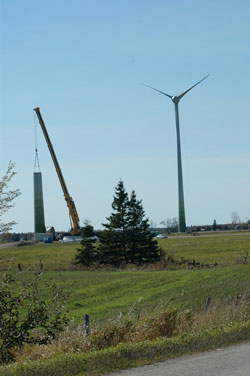Posted on
By: Steve MaxwellUpdated on November 22nd, 2015
I wish more people would ask the kind of questions you do, even if the answers aren’t all that easy to pin down. When it comes to energy technologies, discovering the accurate and full cost to society isn’t as easy as it looks. While it’s true that wind and solar installations only exist today because of heavy government subsidies, it’s also true that the nuclear energy industry has enjoyed many decades of huge financial help, too. There is also the ever present prospect of trying to figure out the cost of a potentially disastrous nuclear accident. Electricity generated by nuclear plants seems clean enough when you only look at the plant itself, but what about the responsibility of dealing with nuclear waste that will remain deadly for the next quarter of a million years? How do you put a price on the kind of nuclear disaster that happened earlier this year in Japan? Events like that really boost the cost per kilowatt-hour! Few nations design and build things more diligently than the Japanese, and yet their technology was still vulnerable.
 So where do we go as a society? As subsidized as new wind and solar installations are, I think they’re a good thing. I consider them a kind of research and development investment, ultimately leading to the safest and most sustainable ways to generate electricity. New technologies and new infrastructures do cost money, but this is a necessary investment given the best information that we have about the risks, benefits and impacts of competing technologies.
So where do we go as a society? As subsidized as new wind and solar installations are, I think they’re a good thing. I consider them a kind of research and development investment, ultimately leading to the safest and most sustainable ways to generate electricity. New technologies and new infrastructures do cost money, but this is a necessary investment given the best information that we have about the risks, benefits and impacts of competing technologies.
One thing to keep in mind is how difficult a job our governments now face when it comes to energy leadership. Over the next 20 to 30 years I’m convinced that our world will be turned upside down as we lose the many benefits and efficiencies we’ve enjoyed during the last 100 years of crude oil. We tend to think of the different forms of energy fitting into their own distinct compartments. The trouble is that that’s not really the way the world works. Even now, as the cost of fueling up our cars with gasoline becomes more and more unacceptable, manufacturers and citizens are looking to electric vehicles. But has anyone thought for a minute what a large-scale shift away from gasoline and towards electricity will do to our generating and distribution systems?
Over the last 20 years I’ve thought long and hard about energy options, and my bottom line is this: we’re locked into a certain amount of nuclear energy today, but it’s too much of a devil’s bargain for to be a prudent, long-term option. The writing is on the wall for crude oil and everything that it powers. Wind and solar energy options must be developed and refined, even if it does cost us more money in the short and medium-terms.